Eastern Europe, Caucasus and Central Asia
The Klaus Töpfer Fellowship
Under the patronship of Professor Dr. Klaus Töpfer, the former Executive Director of the United Nations Development Programme (UNDP), BfN provides further vocational training for young nature conservation managers in Central and Eastern Europe, the Caucasus and Central Asia. The aim of the programme is to build management capacities, communicate methodological core competencies and key technical concepts, and establish an active network of nature conservation managers in the region. Programme partners include the CMS, the CBD, the UN Environment World Conservation Monitoring Centre and the IUCN.
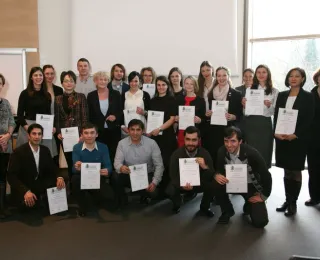
Central Asian Mammals Initiative
As part of a joint working programme, the BfN International Academy for Nature Conservation Isle of Vilm in cooperation with the Convention on Migratory Species supports the further development and implementation of the Central Asian Mammals Initiative (CAMI) with workshops and preparatory studies. Previous focus areas have included identifying areas of conflict between wild animal migration and infrastructure planning, developing concrete options for minimising the barrier effect of linear infrastructure on migrating mammals, recording the population status of, trends in, threats to and conservation measures for selected species under the CAMI, and developing appropriate action plans.
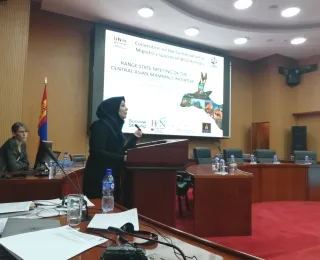
Capacity building for participation in the Intergovernmental Science-Policy Platform on Biodiversity and Ecosystem Services (IPBES)
The Intergovernmental Science-Policy Platform on Biodiversity and Ecosystem Services (IPBES) is a global knowledge platform on the topic of biodiversity and ecosystem services. Its work benefits from participation of ideally as many member states as possible to deliver data for use in surveys and to coordinate the involvement of national stakeholders. Not all regions participate equally however. To strengthen capacities in the region of Eastern and Southeast Europe, the Caucasus and Central Asia, and thereby increase readiness to participate in IPBES activities, BfN works with representatives from responsible authorities, the science community and civil society organisations on the ground.
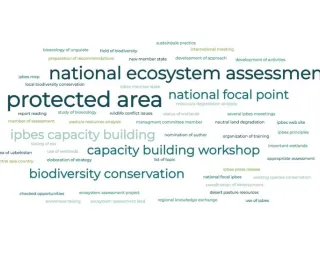
Greater cooperation for improved nature conservation in the western Tien-Shan region
The Western Tian-Shan mountain range has been designated as a UNESCO Natural World Heritage Site in Asia. This transnational World Heritage Site stretches across parts of Kazakhstan, Kyrgyzstan and Uzbekistan, and is characterised by an impressively diverse landscape of scenic beauty. In 2019, at the request of the World Heritage Committee, the three countries signed a joint declaration of intent to improve transboundary management of the Western Tian-Shan World Heritage Site. The project is designed to intensify cooperation and improve monitoring and implementation of conservation measures.
Protecting the saiga antelope in Kazakhstan
Since 2009, BfN has supported technical projects aimed at protecting the saiga antelope in Kazakhstan. Using environmental education programmes and designation of large-scale protected areas, loss of habitats for this key species could be countered and its effective and participative management ensured. Activities largely focused on measures to combat poaching, fragmentation and changes to saiga habitats. Currently, these protective measures are supplemented by an approach that provides for community-based conservation of saiga antelope through the establishment of village-level wildlife protection associations (supported by traditional hunters and former poachers) whose members are recognised as voluntary gamekeepers. First and foremost, this strengthens local capacities and ensures that local people are involved.
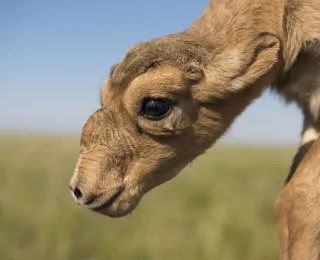
Community-based pasture and wildlife management in the mountain regions of Kyrgyzstan
As part of an advisory assistance programme in Kyrgyzstan, BfN promoted sustainable pasture management in highland pastures in the Tien Shan Mountain Range. This included scientific monitoring of the status of pastures, while regional committees were assisted in developing pasture management plans. It also resulted in best-practice integration of ecological principles and protection of threatened wildlife species in pastoral farming. Pasture users received support in establishing wildlife protection areas to enable community-based wildlife management, as existing usage problems are linked to the decline or extinction of threatened wildlife species. The project activities were rounded off by providing policy advice and strengthening social discourse on sustainable land use.
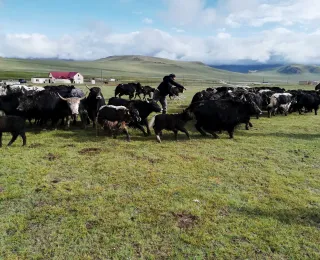
Rewetting and sustainable use of peatlands in the Neman river basin
The Neman river basin encompasses five Eastern European countries (Poland, Lithuania, Latvia, Belarus and Russia) and contains significant stretches of peatland. As part of the project on stakeholder participation for rewetting and paludiculture in the Neman river basin (SPARPAN), representatives from local authorities and from the public and private water, agriculture, forestry and fisheries sectors were provided with fundamental knowledge on the positive effects of rewetting peatlands and wet peatland cultivation (paludiculture). The project helped to ensure that in addition to the production of biomass, the provision of ecosystem services such as water storage/retention, regional cooling, reduction of greenhouse gas emissions and biodiversity conservation are seen and accepted as important objectives in managing peatlands.